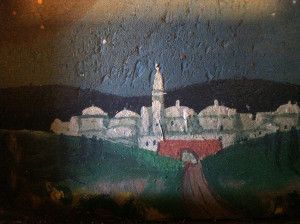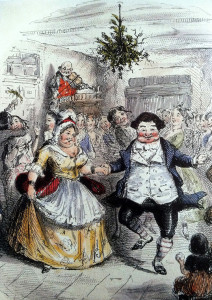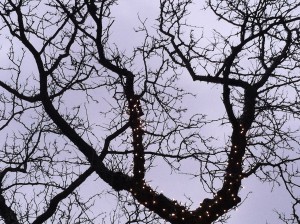
In Italy, there is a common saying, a bit of yuletide advice: Natale con i tuoi; Pasqua con chi vuoi: “Christmas with your family; Easter with whomever you like.” This saying sailed across the Atlantic with my grandparents and is even heard amongst my English-speaking family. It’s spoken in Italian, perhaps to stress its importance and wisdom.
I understood its wisdom only by disregarding it. One Christmas, influenced by the romance of Washington Irving’s writings about Old Christmas, I decided to spend Christmas away from family… and while I did forge some cherished memories and friendships that snowy Christmas night at an inn in North Carolina, it was, overall, a pretty miserable Christmas for me. Natale con i tuoi; Pasqua con chi vuoi resonates with me now, and rings true.
Decorations in Italy center on the creche, and this year, I made a point of venturing deep into the attic of my family home and finding the box labeled “Old Nativity.” It’s from Italy, from the 1950s, probably. My mom made a special trip by train into New York City to purchase it, but it hasn’t been out of that box in the attic in many decades. The stable is wooden and the pieces are plaster, painted by hand. Many of them are broken after all these years (we’re down to one magi). One of the pieces is a shepherd playing pipes, and looking at it, I think of my grandmother, who used to tell me about the zampognari, the bagpipers, who would come down from the mountains on Christmas Eve to play their ancient, almost mournful tunes in the villages, traditional Italian Christmas carols like Tu Scende Dalle Stelle, “You Come Down from the Stars.”
Tonight, we will be celebrating here, with family, as the wisdom of that saying suggests. The mad rush will be over; we’ll settle in for a dinner of seven fishes (another Italian custom), and then go to midnight mass to be with everyone else who has eaten too much and stayed up too late but still has come to hear the old, old story again. In the morning, we will open presents, and here is my present to you: It’s one of my favorite Convivio Dispatches from Lake Worth. It was originally sent out on Christmas Eve, 2011. It’s titled “Like Comets Through the Skies.” Merry Christmas. ––jlc
*
CONVIVIO DISPATCH: LIKE COMETS THROUGH THE SKY
And so again we enter into Christmas, again the old year passes. Here in Lake Worth we are having one of our warm and summery Christmases. But this is okay. Always here at Christmastime there are folks who begin to feel a bit wistful for cold. A white Christmas is all they want. “It’s just not Christmas without snow,” they say, or, “It doesn’t feel much like Christmas when it’s 80 degrees outside.”
Our neighbor Margaret likes to wave her hand at these people and remind them that the first Christmas tree was a palm. This is a saying that was popular on Christmas cards here when I was a boy. A barefoot Santa might be in shorts and an open shirt, relaxing on a hammock strung between two cocoanut palms with a simple “Merry Christmas from Florida!” greeting, but if it was a manger scene, Jesus, Mary and Joseph and the wise men and the shepherds would be surrounded by cocoanut palms––not that there are a lot of cocoanuts to be had in Bethlehem––and inside, the greeting always was the same: “The first Christmas tree was a palm,” which seemed to suggest that we, somehow, were doing things right… and this, admittedly, is not what typically comes to mind when folks think of Florida.
Still, it’s not easy to get past this idea of Christmas being a celebration in cold weather. Pirko Suoma sings “White Christmas” each year at the annual Christmas concert at the Finnish Lutheran Church on the south side of town, and this year was no different. She sings it in Finnish, so for those of us who do not speak Finnish, we listen to her and we follow along in English, in our heads, the words chiseled into our memory. Her solo usually comes about midway through the concert, and she stands up there in front of the rest of the choir and she sings in Finnish and tears begin to well in the eyes of some of the choir members, they miss Finland and snow and a cold Christmas so much. What brought them to Lake Worth? They’ve come to live in a virtual sauna.
Christmas in Finland will most likely be white, and perhaps it will be for you, as well. But for us this time around, it will be beach weather. There is at least one Father Christmas who seems to like it this way: We’ve had numerous Santa Claus sightings in Lake Worth over the course of the past month. I saw him first riding a bicycle past the house, donning the traditional red fur-lined hat and shorts and a t-shirt, which is not unusual around here at Christmastime, except this guy looked like the real thing, with a big white beard. I saw him again driving an old Volkswagen convertible down Federal Highway, this time in full Santa regalia, with presents piled in the back of the car, and when I mentioned this to Seth, he said he had seen Santa driving through town another day earlier in the week. I have news for you: Santa’s a bit of a speed demon.
Over at St. Bernard’s, Father Seamus has put in a special request for midnight mass with Sister Kathleen, the reluctant organist. It’s a traditional American folk hymn that he found in The Sacred Harp, and he’s asked Sister Kathleen to work it into the service. Seamus knew the words, because he is a man who memorizes and recites poetry, though he couldn’t have told you why he knows them, and yet here they were in this old American hymnal. He was overjoyed at his discovery, and the next day, he passed the book along to Sister Kathleen with the suggestion that the song be sung a cappella, no organ. “To preserve the spirit of the hymn,” he said. He wants it pure, simple, and with none of the extra notes that Sister Kathleen is apt to add through no fault of her own. The song is “Wondrous Love.” Do you know it?
What wondrous love is this, oh my soul!
What wondrous love is this, oh my soul!
What wondrous love is this that caused the Lord of bliss
To send this perfect peace to my soul, to my soul,
To send this perfect peace to my soul.
Two additional verses follow, with winged seraphs and millions joining the theme. And it is this simple song that Seamus is looking forward to more than anything this Christmas, his gift to himself. He’s not a White Christmas kind of guy, Father Seamus. He didn’t have many white Christmases in Ireland, and he’s not so fond of Bing Crosby’s vocal stylings. Pirko Suoma’s solo at last week’s concert at the Finnish Lutheran Church may have inspired a few tears, and Wondrous Love will certainly do the same, at least for Seamus. But he won’t be alone. He never is. Something about the right combination of incense and old hymns manages to squeeze a tear or two out of people, even the ones you’d think have not a drop of water to spare. We sit there in that dark church and reflect and think on all the wrongs we’ve done and we resolve that next Christmas, things will be different. And so Christmases come and go, and the years go by, and always we do the best we can, and that’s not so bad, is it?
And whether in a sleigh or in a Volkswagen Cabriolet, in comes Father Christmas. “In comes I, old Father Christmas, welcome or welcome not. I hope old Father Christmas will never be forgot. Christmas comes but once a year, And when it comes it brings good cheer. Roast beef, plum pudding, strong ale, mince pie: And who likes that better than I?”
Merry Christmas. May Christmas Eve and Christmas Day and the Twelve Days of Christmas that follow all be filled with good cheer and happiness for you and for those you love.
John
Image: The painted background of the stable of that 1950s creche from Italy.


